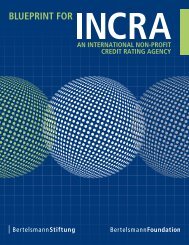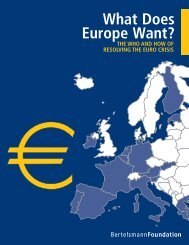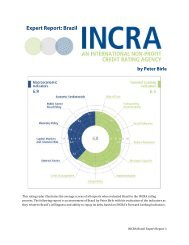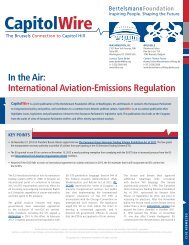BF-FieldManual-FEB13 -3.pdf - Bertelsmann Foundation
BF-FieldManual-FEB13 -3.pdf - Bertelsmann Foundation
BF-FieldManual-FEB13 -3.pdf - Bertelsmann Foundation
- No tags were found...
You also want an ePaper? Increase the reach of your titles
YUMPU automatically turns print PDFs into web optimized ePapers that Google loves.
centralized authorities and have resistedgranting them additional powers oraccess to the most sensitive information.Such fragmented jurisdiction shouldremain a source of concern for the US.European PerspectivesWhile Europeans noticed a markedimprovement in cooperation oncounterterrorism in the Obamaadministration’s first term, cognitivedissonance still exists between the US,the EU and some member states. Thistension is at least partially due to USbehavior toward Europe; at times theUS has been perceived as either actingunilaterally (e.g., the imposition of ESTAand its associated fee) or seeking outthe path of least resistance, sometimesnegotiating with the EuropeanCommission and sometimes with themember states, ultimately causingtensions between the two. This has beenthe case with the VWP negotiations,and the Obama administrationconsidered a similar strategy for thePNR negotiations. But this piecemealapproach is deeply resented in Brussels,as the 27-member bloc struggles toachieve a unified position on justice andWhile Europeans noticeda marked improvementin cooperation oncounterterrorism in theObama administration’sfirst term, cognitivedissonance still existsbetween the US, the EUand some member states.THE STRUCTURE OF THE TRANS-ATLANTIC TRAVEL ECONOMYThe liberalized US-European travelmarket is at once an economic boonto the trans-Atlantic economy and apotential gap in US homeland securitypolicy. To understand sustained USefforts to create a travel market that isboth open and secure, it is importantto examine the scope of this economicrelationship. Total travel-related outputof the international travel industry inthe US was $1.9 trillion dollars in 2011.The US enjoys a net sectoral tradesurplus in travel of $42.8 billion, most ofwhich comes from Europe. The industryincludes 14.4 million jobs, which whileat least partly international in nature,are primarily in small and mediumsizedenterprises (SMEs). 4 Former USCommerce Secretary Gary Locke hasstated that SMEs make up “80 percentof the travel and tourism industry.”The promotion of international traveland tourism dovetails with the Obamaadministration’s focus on job creationthrough SME growth.The trans-Atlantic travel market hasstrong seasonal fluctuations. In 2011,the number of travelers to the US fromEurope ranged from about 600,000 inJanuary to about 1.3 million at its peakin July, a difference of 700,000 people. Intravel from the US to Europe, the pictureis even more pronounced.The sector is also somewhat vulnerableto exogenous shocks based on bothNumber of Passengers1,700,0001,500,0001,300,0001,100,000900,000700,000500,000300,000Travel between the US and EU (2007-2012)Jan - Dec2007Jan - Dec2008US Travelers to the EUeconomic downturn and political risk.For instance, the zenith of the financialcrisis at the collapse of Lehman Brothersin September 2008 was accompaniedby a precipitous drop in the number ofinternational travelers to the US. 5 TheOct. 3, 2010, State Department travel alertwarning of a potential terrorist attack inthe UK, France or Germany prompted 19percent of travelers to cancel their travelplans and 52 percent to reconsider travelto Europe according to one survey. 6The effect of the economic downturnwas a precipitous drop in travelersfrom major European countries in 2009,with some recovery in 2010 and 2011.Jan - Dec2009Jan - Dec2010Source: ITA, Office of Travel and Tourism IndustriesJan - Dec2011Jan - May2012European Travelers to the USHowever, recovery has not occurred inall major European markets, as seen inthe 16 percent drop in British travelersto the US since 2008. These numbersbely an even more dramatic drop in totalspending by European visitors duringtheir time in the US. Since 2008, Britishspending has declined by 27 percentand German spending by 3 percent.While French travel and spending hitrecord highs in 2011, its ranking as atop international spender has droppedafter decreasing 14 percent in 2009 and1 percent in 2010. 7 In total, travel-relatedspending from European countries hasfallen by $6.29 billion since 2008. 8Counterterrorism and Homeland Security3 9






